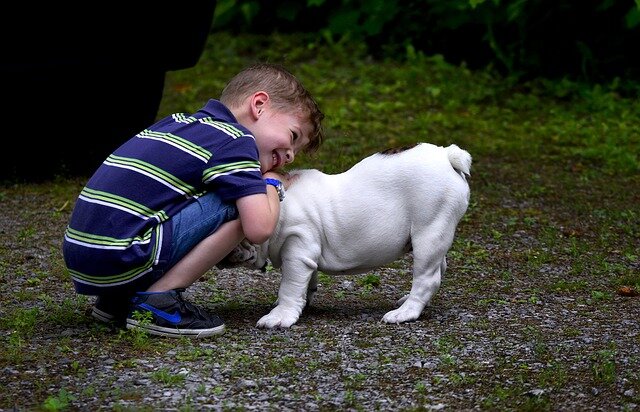Service Dogs For Children With Autism
2021-07-15
We all know animals are incredible. They make great companions for anyone, young or old. Dogs have a reputation for being man’s best friend, and they really do live up to this nickname – especially those trained to be service dogs.
A service dog can be an incredibly useful tool for those who struggle with physical and mental health issues. For those who have, or families with a child/children who have autism, a service dog – or, more specifically, an autism assistance dog – can be a great help.
This article will show how a service dog can help a child with autism live an even more fulfilling life.
How Service Dogs Are Different From Family Pets
It’s worth saying upfront that a pet dog and a service dog are not the same things. Pet dogs act as companions for a whole family, whereas a trained autism service dog has a specific job to do.
Service dogs go through special training in order to help an owner who has some form of disability. This can be a mental or physical disability that significantly impairs an individual’s life.
These animals can help with many day-to-day tasks, including fetching and carrying items, working as hearing or seeing-eye dogs, alerting to medical issues, helping people with autism, and so much more.
What Do Autism Service Dogs Do?
Autism service dogs or, as they are usually referred to, Autism Assistance Dogs, are specifically trained to handle the needs of those with an autism spectrum disorder.
For children, the main aim of this special pup is to help create independence for both the parent and the child. The dog acts on the instruction of the parent, and the child is encouraged to walk alongside their dog. The pup is there to ensure the safety of the child.
An autism service dog is trained somewhat differently from a traditional service pup. These pooches work with a team leader – who is usually the parent – and wear a harness that discreetly and safely attaches to the child so that they can walk together. It is a combined effort by the dog and the parent to ensure the child is safe and well while outside or in public.
Ultimately, though, service animals provide the same comfort and joy as a pet with the added benefit of specific training.
How Can Service Dogs Help Children With Autism?
It’s all well and good to say that an autism assistance animal will help families who have autistic children, but how do they help?
There are many practical ways your family can benefit from a well-trained pup. During their training, service animals are taught to do many things, including:
Maintaining a Routine
Domestic animals live their lives on a routine, much like people. They need feeding, exercise, sleep, recreation time – and for pups especially, this can be marked down to the hour. This can be something that really aids an autistic individual.
If your autistic child thrives by having a set routine, a service animal that fits into that routine can be a real benefit. It will also allow for a level of independence as your child will have to get up, feed the animal, let them out and play with them.
Preventing Unsafe Behavior Like Bolting
As any care provider may know, autistic children can suddenly run away or wander off when out in public, which is potentially dangerous.
As part of their training, assistance pups are trained to sit when their child presents this behavior. As the child is safely attached to the animal, the weight is enough to stop the child from getting too far and also means the parent doesn’t have to have their eyes constantly glued to their child when they have something important to tend to.
Stopping Repetitive Behaviors
Sometimes people who struggle with their autism develop repetitive behaviors, some of which can be disruptive or harmful.
A pup can notice this starting to happen and get themselves in the way to interrupt it before the child can do themselves damage. The dog will nuzzle onto the child’s lap or move their hands out of the way if they are hurting themselves, with the intention that the child will stroke or snuggle them instead.
Providing Comfort in Unfamiliar Places
Strange, unfamiliar surroundings can be overwhelming at the best of times, but for individuals with autism, it can be unbearable. Having a familiar animal at their side can be of great comfort to a child as they have something tangible to talk to or sit with to calm down in the moments that get too much.
Having their dog there, who is trained to be calm and well-behaved no matter the situation, can have a calming effect on a child who feels out of their depth.
Reducing Stress in the Family
Having a stress-buster at your disposal as a parent of an autistic child can be crucial. The service dog won’t just benefit the individual, but it will also help the rest of the family.
If you are the other member of the animal’s team, they will listen to you when you need them to perform a specific task, be there to ensure the safety of your child when you’re busy, and also help everyone in the family stick to a neat routine.
Learn More About Service Dogs for Autism
Autism spectrum disorders vary in severity, and the individual’s unique needs are the most important thing to consider. Although they can be life-changing, bringing a service animal into your home is a huge commitment, so we’re here to provide all the information about how they can help you and your family.
At Service Dog Registration, we are more than happy to help you. If you have any further questions or need more information about how to get a service dog for your autistic child, contact Service Dog Registration of America today.
